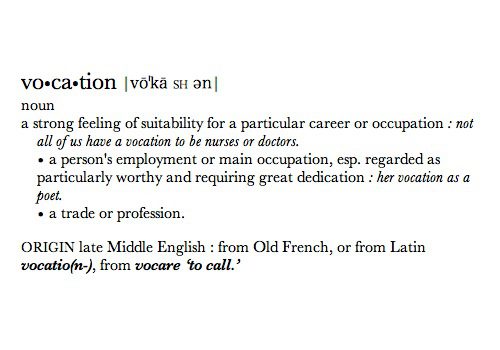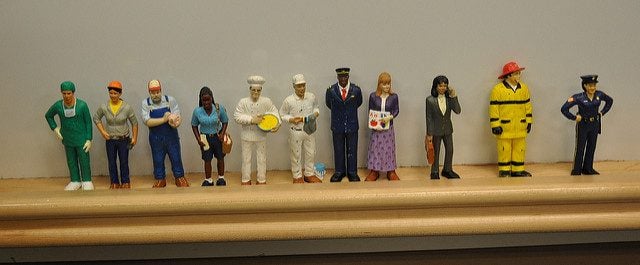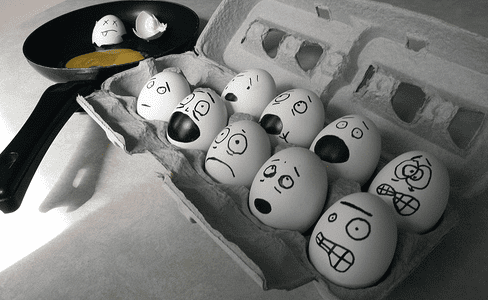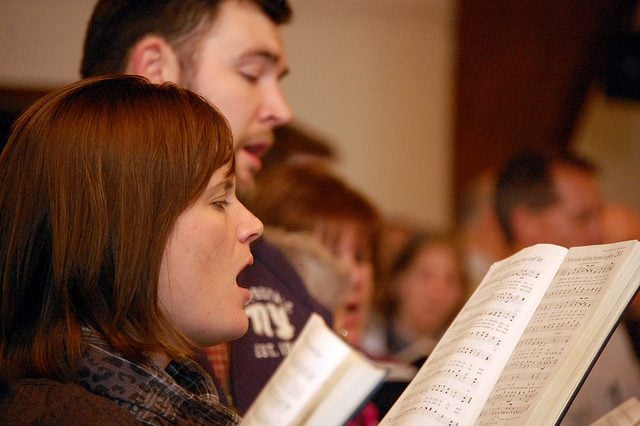When I was a church pastor, I observed that Christians sometimes have an erroneous belief that there is a sacred-secular divide between our work life and our church life. A Sunday-Monday divide, if you will. We certainly believe that our prayers, church attendance, and church-based service are important to God. But we don’t always think that our time spent at work or school is important to God. Labor Day is a time to rethink the relationship between work and faith.
Martin Luther’s concept of “vocation” can be helpful for Christians.
Luther wanted Christians to see their station in life as the very mission field into which God has sent them. He called this the “priesthood of all believers,” meaning that each person’s work has deep significance no matter who they are, or what they do for a living. Every person’s work matters to God. Whether you are pastor or mechanic, a father changing diapers or a Wall Street banker, a military general or a nurse – all work matters to God.

Your work is the place where people can see you as a Christian in action.
They can see the difference your faith makes in what you do, how you treat people, the decisions you make, and how you conduct yourself. Your workplace is where you are “the salt of the earth” and “the light of the world” as Jesus describes in Matthew 5:13-16. You can contribute to the Kingdom of God no matter where your vocation has placed you.
Luther saw our work as a context for ministry.
Think about it — your workplace is filled with all kinds of people facing all kinds of challenges — illness, fear of losing their job, adultery, grief, confusion, ethical dilemmas, criminal negligence, stealing, racism, office politics and so on. Frankly, in many ways you’re more in touch with the needs of the world than pastors.
When I was serving as a pastor, I once invited parishioners fill out a questionnaire called, “You and Your Workplace” on Labor Day Sunday. The idea was to have people thinking intentionally about their jobs, including the ethical and moral dilemmas they face, the aspects of their work that they enjoy, and whether the church plays a role in their work life. When I read through the surveys I received back, I learned a great deal.
What do people most enjoy about their jobs?
People look forward to being able to work in the field that sparks their passion.
Whether it’s accounting or teaching, making music or making airplanes, practicing law or practicing medicine, there is a feeling of deep satisfaction that comes from contributing to the world through the skills and knowledge you have gained in your training, through solving problems with creativity, and engaging in intellectually stimulating work that exercises and expands your mind.
But what really stands out for most people, no matter what field they’re in, is the people.
When you find yourself surrounded by co-workers who share your passion, and colleagues who are committed to the same high standards that you share, there’s a camaraderie that develops. You feel that synergy, and it’s very energizing. Sometimes we even become close friends with co-workers, which is even more special and rewarding. So, it’s the people who really make work enjoyable.

And do you know what causes the most problems in work?
Yes – the people!
The very same human beings whom we would like to look forward to working with can be the very same ones who cause us the most headaches. Getting along with difficult people is one of the most common struggles in the workplace. Sometimes it’s a co-worker who’s goofing off and not pulling her weight. Sometimes it’s how a co-worker or supervisor mistreats a fellow worker or underling, demoralizing and disrespecting them. And sometimes it’s someone who does real criminal harm, such as stealing money from the company, covering up mistakes to avoid a penalty, or committing racial or sexual discrimination.
So with all this in mind, how does the church fit in to your work life?
When people face moral and ethical dilemmas, this is when they find the church’s teachings most helpful. Whether it’s hearing a sermon that feels like it was addressed specifically to you that Sunday morning, or a Bible study that gives you insight as to how to deal with a problem, or simply the Ten Commandments that you learned in Sunday School and Confirmation. “Do unto others as you would like to have done to you,” Jesus taught.
One person wrote in their survey: “The church is a tremendous source of strength and inspiration for me. The balance in worship, education, fellowship and service opportunities at church is wonderful and does much to meet my needs.”
That’s the good news. But there’s one area of life that the church not only has failed to address enough, but, indeed, has actually contributed to the problem in some respects. What am I talking about?
Stress!

Finding the balance between work, school, family, church, and other activities is one area where few seem to have found the solution. One person put it this way in their survey:
“There is stress that comes from balancing time for technical and business needs with the time for developing my employees. My greatest enemy is time – it always seems to be working against me. One sure way to ‘get ahead’ is to work 10-12 hours each day, and come in on Saturdays and work from home on Sundays. Those who advance the fastest and farthest do so not because of ability, but because of time committed. There is competition for time between work, helping kids with school and sports, maintaining the house and church. There never seems to be any time left for me.”
Does that sound like something you could have written?
More pressure, less satisfaction
I read a corresponding description of the current state of the work life in our modern world in a little booklet called, Supporting Christians at Work: A Practical Guide for Busy Clergy, written by Mark Greene, who served as the Executive Director at the London Institute for Contemporary Christianity. He writes:
“Workers are suffering increasing levels of stress, anxiety and depression, with less relational satisfaction, less sense of purpose and significance, and consequently with greater pressure on every other area of their lives . . . Interestingly, many people are not working longer and harder because they are ambitious or materialistic. They are working harder because they feel that, if they don’t, their employers will find someone who will.
This is not just a middle-class, white collar phenomenon. Workers at every level are suffering. We [as pastors] need to help people cope, and, as a church community, we need to begin to challenge the system that oppresses people. And we need to help each other co-labor with God to transform it.” (Greene, pp. 12-13).
But, as one parishioner pointed out, while the church is sympathetic and helpful about moral and ethical issues, it is much less sympathetic about time issues:
“The church wants as much of my time as my job and the kids’ sports teams . . . but I just don’t have enough time to go around. Church wants me to be more and more involved . . . It can add to the stress.”
One working mother in our congregation shared with me that she made a major decision in her life for the coming year. She resigned from all the boards on which she was serving. She stepped back from her involvement in all of her volunteer activities. And she said no to my invitation to serve in a particular ministry of our church for this coming year. She wished she did not have to do it, but felt that she had to make some radical decisions and recommit her time to her family. She was going to do this for one year, and then re-look at where she wants to step up her involvement in church and other activities.
I told her I admired her for having the courage to say no, to set her boundaries, and then protect her boundaries.
I told her I wished more people had the courage to do what she was doing and set her priorities on their family and their own self-care. And she said, with relief, how much it meant to her to have that kind of support from her pastor and her church.
We don’t want the church to be part of the problem. We want to be part of the solution.
I encourage pastors to find out how they can help their parishioners address these chronic problems of stress and exhaustion, not only in the workplace, but in all aspects of life. Think of ways the church can be a resource for Christians in their work. To help find meaning and purpose, as well as time for rest and restoration. To discern the ways in which God is helping them to navigate the demands of life.
Ask: How can the church equip you to be a Christian in the place where you spend two-thirds of your waking time? How can we assist you as you cope with the stress of life?
1. Provide a space and time for people to be able to share what their work means to them.
This was another important thing I learned from the surveys. As someone pointed out, not every workplace is a lion’s den or a fiery furnace. There are some people who find that the places where they work are filled with kind, caring and supportive individuals. There are some people who have sought out jobs where they can engage in meaningful, important work that honors their integrity. It’s important that we hear these stories. Perhaps we can have forums where our work stories are shared – the good, the bad and the ugly – with the hope of providing a place where we listen generously to each other.
2. Consider creating a devotional booklet that focuses on work as a spiritual practice.
Ask people to share how their faith works at work. What better way to hear how people are doing this than to read their stories and reflect on their insights as to how God is working in their work life?
3. Have youth interview working adults for a video series: Where I Find God in My Work.

Ask adults to answer just three questions:
a. What is your work right now?
b. Where do you see God in your workplace?
c. How can the church help you in your work?
Not only does this equip youth for helping to tell stories of faith, it also helps them appreciate the ways in which God blesses all kinds of work.
But you know where I think the church can be most helpful?
4. Doing what the church is already equipped to do – providing sacred time and space for the hearing of God’s Word, and the administering of the sacraments.
Just coming to worship can be an oasis of stress-free time for you and God. As one person put it in their survey:
“Church helps me keep my life in check. It reminds me of what is really important. I look forward to Sunday mornings because it is almost a safe haven in church. For one hour I can enjoy just sitting, singing, and listening without having to be a leader, make decisions, or be interrupted. My friends at church help me keep focus, and I draw on them for strength and guidance.”
That’s why God gave us the Sabbath. That’s why Jesus Christ established the church. I hope you find your church sanctuary to truly be a sanctuary. A place where you can rest from your labors. A time when you can relax into the presence of God.

And on this Labor Day weekend, may God bless your time “for yourself, for your co-workers, for the health and vitality of your family, and your church, for the growth of God’s kingdom, and for the good of the world,” (Greene, p.4).
As we read in Matthew 5:14-16:
‘You are the light of the world. A city built on a hill cannot be hidden. No one after lighting a lamp puts it under the bushel basket, but on the lampstand, and it gives light to all in the house.
In the same way, let your light shine before others, so that they may see your good works and give glory to your Father in heaven.’

Leah D. Schade is the Assistant Professor of Preaching and Worship at Lexington Theological Seminary (Kentucky) and author of the book Creation-Crisis Preaching: Ecology, Theology, and the Pulpit (Chalice Press, 2015).
Twitter: @LeahSchade
Facebook: https://www.facebook.com/LeahDSchade/.
Source: Supporting Christians at Work: A Practical Guide for Busy Clergy, Mark Greene, 2003, Evangelical Lutheran Church in America

















